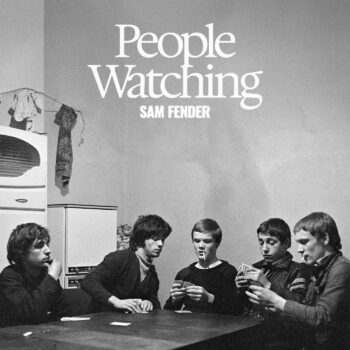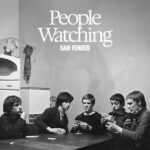Sam Fender’s ‘People Watching’ is a brilliant ode to the North East and an instant classic. Ranging from his typical Springsteen-esque anthems to slightly more stripped indie rock sounds, it’s easy to say that Fender’s third album is a rousing success.
Stream: ‘People Watching’ – Sam Fender
I’m not preaching, I’m just talking, I don’t wear the shoes I used to walk in. But I can’t help thinking where I’d be in this crumbling empire…
* * *
Frankly, it’s rare to find such an outspoken and genuine artist as Sam Fender.
The English singer/songwriter flaunts his northern roots and hometown proudly with a fiery gumption that comes through in perfect clarity in each of his projects. With songs like “Seventeen Going Under,” “Hypersonic Missiles” and “Spit of You,” in his discography, it’s no secret that Fender has an innate ability to evoke precisely what he intends in a lyrically stunning and musically emphatic way. As an advocate for those who have to put in twice the work to be noticed in the industry, and a frequent purveyor of a politically honest and charged song, there is something about Fender that hits differently. He’s a real artist – one who lets his influences come through while not infusing everything he touches with that spark that can only be ascribed to him.

Released February 21st via Polydor Records, Fender’s third studio album People Watching is an all-around masterpiece of storytelling.
The opening title track delivers the perfect upbeat, drum-driven rock anthem to introduce the album and the world it conveys. The song is nostalgic and oddly reminiscent of running. It could be running towards a future and a new life, but not without letting the past peer in and tug. It’s a song of lost love, hope, memory and heartbreak. Fender paints an image of remembrance for life and love once known that doesn’t cease to linger.
I people-watch on the way back home
Everybody on the treadmill, runnin’
Under the billboards, out of the heat
Somebody’s darling’s on the street tonight
Oh, I can’t stop runnin’
I see the whole town fall
“Nostalgia’s Lie” is a rock-soaked reverie of days that perhaps weren’t as good as they seemed in the moment. Fender sings of the realization of reality, of that moment when the rose tint fades and the bleak state of what was is revealed: “What is this place? / Can you take me back to somewhere darling / Where I feel safe?” There’s an element of wishful hoping in the song, that just maybe there’s the chance that you can return to that state of bliss where everything was still beautiful, when harsh realities were still unknown and could be made out to be different that they were.
For all my friends who are gone
Those were the times where we all had nothing
Most my friends are still against it
For all I’ve gained, there’s something lost
Backed by generally simple instrumentation, the track flows easily as it muses about the once perceived ‘good ole days.’ There’s no bit of tension in the track, just wonder and an undeniable ache that is highlighted exceptionally by Fender’s vocal quality. “Nostalgia’s Lie” is sincere and perhaps a little naive, but knowingly so as a new vision of life takes hold.
Referencing issues with UK politics and the state of living in the North East, particularly among struggling, poverty-stricken communities, “Chin Up,” stands as a song to pay its respects once again to a harsh reality. What’s most striking about the track is how Fender balances his privilege as a successful musician, dealing with fame and fortune, with seeing the place he came from and knew fall victim to hardships. “Entitled, idle and dumb / Twenty-eight, still sucking my thumb / Hard truth’s I’m dancing to the rhythm of it / Scarred youth, but now I’m actually going through it.”
Continuing in the theme of reflection – both of the self and of his past and the present state of things – Fender reverts to discussing ideas he once wrote about in “Leave Fast” from Hypersonic Missiles, in “Wild Long Lie.” The sentiment between the two songs remains the same, where Fender once sang “Leave fast or stay forever” he now sings, “I think I’ve got to leave this town.” As a whole, the song lends itself to evoking that of the Hypersonic Missiles era. With a base of jangling guitars and an emphasized atmosphere that’s made almost sparkly by keys and synths, and punctuated by the inclusion of a saxophone, the track is just outstanding.

“Arm’s Length” leans just slightly more into pop territory, though, elements of rock and indie rock are what propel and maintain the track’s longevity. Of note, “Arm’s Length” is especially self-reflective and critical on the part of Fender. He admits, “I’m selfish and I’m lonely,” and subsequently asks, “So, oh, do you have to know me, know me inside out? / Do you have to know me, know me inside out / To have a good time?” indicating, rather candidly, that he would prefer to keep people at a distance (an arm’s length) than let them see him for who he is.
“Crumbling Empire” returns and further dissects the issues discussed in “Chin Up,” and it’s a rather poignant song upon inspection. With lyrics like, “I don’t wear the shoes I used to walk in / But I can’t help thinking where they’d take me / In this crumbling empire,” and the various intimate vignettes of reality, Fender strikes a chord that’s simply resonant. If there is one thing that can be said without question about Same Fender and his musicianship, it is that he is an artist for the people. He crafts with an unbridled authenticity that is wholly revealing of his adoration and respect for those who persevere regardless of circumstances, and he criticizes the circumstances and authority that do little evident work to prevent such situations.
My old man worked on the rail yard
Getting his trade on the electrical board
It got privatised, the work degraded
In this crumbling empire
My mother delivered most the kids in this town
My step-dad drove in a tank for the crown
They left them homeless, down and out
In their crumbling empire
Put succinctly, Sam Fender creates purposefully and genuinely. He devotes himself and his work to building up the common folk. Regardless of whatever success he as an individual has achieved, Fender never strays too far from his roots.
Now, just past the mid-point of the album, Fender introduces an orchestra into the mix with “Little Bit Closer.” The track speaks of God and religions and Fender’s relationship with such subjects. As always, Sam explicitly states and scrutinizes his qualms with religion and religious teachings. Whether it be gay conversion therapy or how it can seem that despite what they preach, it seems that those who are impoverished are often taken advantage of by the church, Fender shares his perspective and relationship with God and religion. The track is incredibly vulnerable as Fender asks, “What is God?” and says, “I never found it,” while sharing his own experiences and the experiences of people he knows that he has witnessed concerning their and his treatment by the church that have led him to this conclusion.
Coming in with a distinct bass line and slightly bluesy, floaty keys, and airy backing vocals, “Rein Me In” is a welcome change in the instrumentation as compared to what is heard in most of the album. Where the majority is rock or at the very least indie rock inspired and sounding, this track explores a different, lighter side of Fender’s capabilities.
Once again donning an introspective look at love and relationships he sings, “I wish I could tell you everything / But my stomach was too weak / Sometimes it’s easier to throw away your love / Instead of accepting its defeat.” The song is generally lower stakes than anything else on the album, or really within his discography, which is a welcome breath of fresh air for an artist who spends so much time lending himself to various social and political causes in his work.
I’m working myself up to a nice, warm bliss
All my memories of you ring like tinnitus
If I stop, it’s just pain
Please don’t rein me in
Falling into a darker tone and subject, we have “TV Dinner.” What propels the song is the cadence and timbre by which Fender delivers the lyrics. Backed by a sonorous piano, while slowly builds into a “Skyfall”-esque crescendo of electric guitar, pounding percussion, and keys, the song is strikingly inward in its criticism of spectators on artists or people in the public eye. “TV Dinner” takes a look at how severely disregarded an artist’s struggles and needs are by industry officials, critics, and even fans. Between the fetishization of the famed, the constant criticism of the famous (warranted or not), the glorification of their struggles, loss of privacy, and the prevention of allowing people to evolve and establish their true identities, Fender addresses it all. In particular, he addresses the horrible damage done by the music industry in their near-constant exploitation of artists. While he leaves most of his accusations to be non-specific (but wholly valid) claims, he does make a clear reference to Amy Winehouse in his lyrics:
Like Winehouse, she was just a bairn
They love her now but bled her then
They reared me as a class clown
Grass-fed little cash cow
I cashed out, headed hellbound
And now they point and laugh
Fender reveals the duality of spectatorship. So often we laud endless praises at people we deem ‘worthy’ of fame and success, and then, for sometimes no reason at all, we switch the narrative and berate them at the height of their career. Until later, long after they’re dead, we take back our word and only sing of how wonderful they are. It can be a jarring realization as a spectator, but a very necessary call out. Fender seems to beg in this song for some humanity to prevail, and for authorities to remember that those who are famed are real people who face real struggles regardless of any amount of power or money they have to their name.
Posh cunt had me irate,
he said, “We’re all the same”
Are you wild? Do you have enemies?
A start with no amenities?
A mark that bleeds a legacy?
A spark without tuition fee?
A darkness that they envy?
They frenzy to befriend me
But I know ye, you’ll sell me
You’ll sell me, you’ll kill me
With that, in “TV Dinner,” Fender also touches on class issues and legacy. Some institutions are built to support those who already have access or a more open gateway toward success, while others who deserve just as much of a chance at success are met with more closed doors and obstacles.
In the end, Fender takes a moment to ask himself, “ Am I up to this?” ruminating on the fact that for however long he remains in the public eye, allowing himself to be judged and praised, he won’t get a say in what his narrative ends up as. One day he may be a villain, the next a hero, and a week from now a complete nobody, and none of it is up to him.
While the song is rooted in major institutional problems, Fender brings it into perspective by relating it back to how it impacts him directly.
As the album reaches its close, “Something Heavy” offers an upbeat culmination of all that was discussed throughout People Watching. “Something Heavy” is simply a universal track. It refocuses and allows for there to be recognition that whatever someone’s life is like and what their circumstances are, their problems are no less valid than anyone else’s. Supported by the more acoustically driven instrumentation through the use of an acoustic guitar and mandolin, and the syncopated rhythm of the drums, the track is cathartic in its reverential release. Not to mention, there’s also something about Fender’s vocals that further elevates the song and emphasizes lyrics like, “She grabbed me by the arm, kissed me to disarm / The anger that I’ve carried like a rock me whole life.” There’s some sort of emotion in his tone that sends the chorus into orbit, there’s something about Fender that just emits a unique sincerity.
Everybody here’s got something heavy
I’ll shoulder it a while if you just want a night off
You and I are dangerous, f*ed lovers
Whittling away at this bag of rocks
Bringing People Watching to a close, Fender concludes with “Remember My Name,” a dedication to his grandparents. As far as climaxes in albums go, this is surely one of the best. It just feels massive despite its overall modesty in terms of lyrics and instrumentation. The track grows with huge swells in its orchestration throughout the duration of the track, spotlighting Fender’s insanely powerful and raw vocals that exude his desire to establish a legacy.
And I’ll pray you’ll remember my name
And I’ll pray you’ll remember my name

Perhaps to soon to say, as Sam Fender is still young in his career, but I’ll say it anyway: The integrity by which Fender creates is something unmatched by many artists, especially of the modern day.
He may be called the Geordie Springsteen and likened to Tom Petty and Bob Dylan, but there is something distinct about Fender that sets him apart from even those greats.
A legend in the making, he is an essential artist and surely on his path to greatness, if People Watching is anything to go by.
— —
:: stream/purchase People Watching here ::
:: connect with Sam Fender here ::
— —
— — — —

Connect to Sam Fender on
Facebook, Twitter, TikTok, Instagram
Discover new music on Atwood Magazine
© Sarah Louise Bennett
People Watching
an album by Sam Fender


 © Sarah Louise Bennett
© Sarah Louise Bennett





